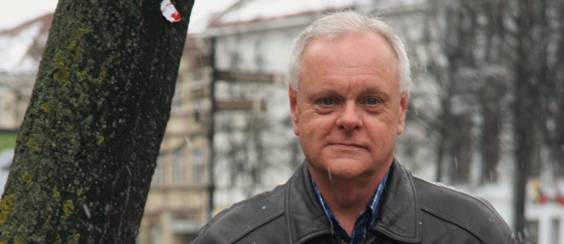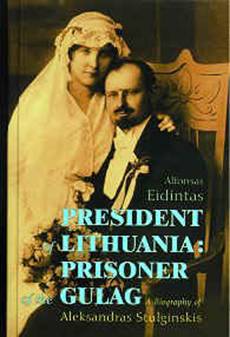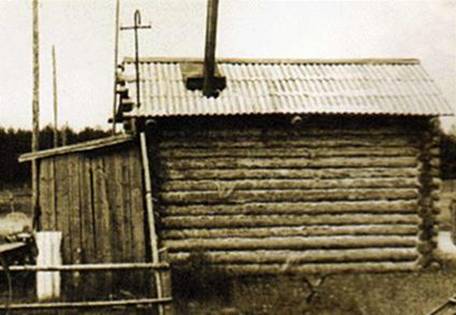
THE VOICE OF INTERNATIONAL LITHUANIA
|
VilNews has its own Google archive! Type a word in the above search box to find any article.
You can also follow us on Facebook. We have two different pages. Click to open and join.
|
The book, "1939, The Year that Changed Everything in Lithuania's History” reveals the unflattering response by the top leadership, their abdication, and flight from the nation, leaving the population defenseless... without any responsible and effective resistance… as if independence never happened
 Book author: Sarunas Liekis |
 Tony Mazeika |
In a comment to our VilNews article series "Lithuania and the Soviet Union 1939-1940" ( Section 10 - HISTORICAL LITHUANIA) Tony Mazeika from Mission Viejo in California writes the following:
"It is necessary to read the full account of Lithuania's leadership response to Soviet demands and occupation in 1940. The book, "1939, The Year that Changed Everything in Lithuania's History", Arnas Liekis, reveals the unflattering response by the top leadership, their abdication, and flight from the nation, leaving the population defenseless...without any responsible and effective resistance. It's as if independence never happened. Lithuania, together with Latvia & Estonia, make no formal military resistance knowing that Finland fought in 1939-1940 and survived a Soviet onslaught. Much more need to be disclosed about those "patriots" who chose to run rather than fight for their nation."
-----------------------------------------------------------------------------------------------------------------------------------------------------------------
Our VilNews Associate Editor, Vin Karnila, has edited the four articles we have presented on the topic "Lithuania and the Soviet Union 1939-1940" from the personal memoirs of Juozas Urbšys. Here is his response to Mr. Mazeika's commentary:
Easy to say that they should have organized formal Military resistance – and get slaughtered

Vin Karnila
I would like to thank you Mr. Mazeika for sharing your thoughts with us and making us aware of what I'm sure is a very interesting book written by Arnas Liekis.
You bring up a topic that has been discussed many times throughout the years following 1940. The members of the Lithuanian delegation that were involved in the negotiations with Russia have always claimed that they knew that Russia at any time they chose could have invaded Lithuania. They also felt that if Russia did in fact invade, whether there was organized military resistance or not, this would result in catastrophic consequences for Lithuania and its people. Throughout the negotiations they said that what they were trying to achieve was the best possible outcome for Lithuania. In the end what they achieved was the best possible outcome that Russia would allow.
The topic of the courageous people of Finland and their organized military resistance to Russia's invasion of their homeland in relation to the fact that Russia's invasion of Lithuania in 1940 occurred without a shot being fired has also been discussed many times. The question remains how much did Lithuania know or did not know about Finland's armed resistance to Russia in what is known as the "Winter War"?
3 October 1939 the Lithuanian delegation flew to Moscow to begin the negotiations with Russia. 30 November 1939 Russia attacked Finland to begin the "Winter War". By March of 1940 both sides began to negotiate a peace treaty. Did Lithuania know that in spite of the great courage of the Finns the primary factor in Finland's success was that the Winter War was fought in some of the harshest of winter weather conditions and in equally harsh terrain? This harsh terrain the Finns knew like the back of their hand and the weather conditions to them was normal winter weather? Did Lithuania know that if Russia attacked across the gentle rolling hills and flat farmlands of Lithuania in spring or summer that the advantage of weather and terrain, that so greatly helped the Finns, would only make Russia's evil task easier? An invasion of Lithuania by Russia in the spring or summer of 1940 would have been a military situation completely the opposite of the Finland's and Russia's Winter War. Did Lithuania know that whatever peace agreement Finland and Russia came to that it would end up being short lived? Had Lithuania taken notice of the fact that no Western power had come to Finland's aid with any meaningful support? From all reports, Lithuania realized that their Military, no matter how courageously they fought, was no match against the might of Soviet Russia's army.
Many comments have been made and questions asked about the large number of government and Military top officials that left after 15 June 1940. Why didn't they stay? Why didn't they stay and resist? How could they leave their homeland? I would say that the real answers to these questions can only be answered by these top officials that left. Some left almost immediately as if they knew what would happen once Russia occupied the country. Others left after they saw what Russia was doing now that they occupied the country. In fact many people that had the means to do so left once they understood what their future would be at the hands of Russia.
All these questions to all these situations I have asked myself over and over. Again and again I come to the conclusion that more than seventy years after these events occurred, while I'm sitting in the comfort of my home and while I can walk the streets of Vilnius without (for the time being) having to worry about being run over by a Russian tank, shot by a Russian soldier, kidnapped by the NKVD, put in a gulag or executed, I am really not in a position to judge people who were trying to do the best they could for our country and simply trying to survive during very difficult and dangerous times. I guess it could be kind of easy for some to say that they should have organized formal Military resistance – and got slaughtered. It could also be easy for some to say that the top officials and the people of means should have stayed – and got executed, imprisoned, put in gulags or sent to Siberia. Personally I can't judge these people for their actions because I wasn't alive then and I wasn't involved in these dangerous and difficult times. I also refuse to be a "Monday morning quarterback" and go on and on talking about all of the "should haves" for the same reasons I just stated. The opinions of others about these matters though are something I am very interested in.
Having said all this I must say that the discussion of what happened, what did not happen, why it did happen and why it didn't happen during these times are matters that will continue to occupy my thoughts – I'm still trying to understand and make sense of all of it. Again I would like to thank you Mr. Mazeika for sharing your thoughts with all of us and I would also like to thank you for letting us know about the book by Arnas Liekis - 1939, The Year that Changed Everything in Lithuania's History. I'm sure that I am not the only one out there looking for more information about this period of Lithuania's history and I'm sure that I'm not the only one looking for more information about this so that I can try to make more sense of everything.
Dear readers, I'm sure that Mr. Mazeika and I are not the only ones out there that are interested in what happened during these times and we are not the only ones with opinions. We would please invite you to share information and your opinions on this topic with all our readers throughout the world. I'm sure this is something we all are trying to understand better.
Su pagarbe
Vin Karnila
Associate editor
---------------------------------------------------------------------------------------------------------------------------------------
Aleksander Stulgisnkis, Lithuania’s President between 1921 and 1926, decided to stay in his homeland even when the Soviet’s attacked in 1940... He paid a high price...

Cover of the book by Dr. Alfonsas Eidintas, “President of Lithuania:
Prisoner of the gulag (A biography of Alexander Stulginskis).”
Aleksandras Stulginskis, the first constitutional president after Lithuania had declared its renewed independence on 16 February 1918, was kidnapped at his home by Stalinist forces in June 1941 and deported to a Siberian Gulag. After he was released from the inhuman captivity, he was still for years forced to live in Siberia’s deep forests, until 1956.

Lithuania’s President Aleksandras Stulginskis built this Siberian log cabin by his
own hands, living here with his wife Ona until 1956.
How could it be that a former head of state of a free and independent country could be kidnapped in his own home and taken around half the globe to imprisonment in a labour camp where cruelty and inhumanity were the principal characteristics?
How could it be that the rest of the world chose to ignore such an assault against a splendid leader who proudly had been fighting for democracy and independence in a nation that before the Second World War was fully on par with its neighbours in Scandinavia and Northern Europe, both economically and as an independent state?
Just think of what would have been the reactions from the international community if one of the other state leaders from the 1920s had become victims of such a cruel abuse?
Read more at https://vilnews.com/?p=6539
- Bookmark :
- Digg
- del.icio.us
- Stumbleupon
- Redit it
VilNews e-magazine is published in Vilnius, Lithuania. Editor-in-Chief: Mr. Aage Myhre. Inquires to the editors: editor@VilNews.com.
Code of Ethics: See Section 2 – about VilNews. VilNews is not responsible for content on external links/web pages.
HOW TO ADVERTISE IN VILNEWS.
All content is copyrighted © 2011. UAB ‘VilNews’.

 Click on the buttons to open and read each of VilNews' 18 sub-sections
Click on the buttons to open and read each of VilNews' 18 sub-sections 

 Logging you in...
Logging you in... Loading IntenseDebate Comments...
Loading IntenseDebate Comments...

